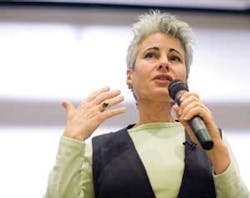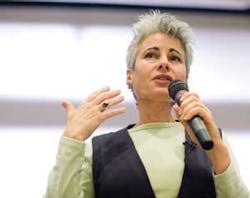Eva Grayzel's story: Surviving oral cancer
by Eva Grayzel Cohen
For more on this topic, go to www.dentaleconomics.com and search using the following key words: oral cancer, cancer, canker sore, biopsy, incisional biopsy, oral surgeon.
What Mom puts herself before her kids? I had a canker sore on the left side of my tongue for a month. Everything else seemed more important. Finally, I took the time to see an oral surgeon.
"This sore on my tongue is killin' me and it just won't go away."
"You have two choices — keep an eye on it and hope it heals, or have it removed with a scalpel."
"I want it out. It bothers me all the time."
So, an incisional biopsy was performed. My tongue healed in a few days.
The office staff called two weeks later to tell me that my biopsy results were negative.
"Biopsy of what?" I asked.
"The oral surgeon took tissue from your tongue, right?"
"Oh, yeah. And it was biopsied? I didn't know."
I thought, What could they possibly be looking for in my tongue? Virus? Bacteria?
"So you have nothing to worry about."
"Great." I didn't even know to worry.
I had no symptoms for two years. Then the sore returned right over the biopsy site. Once again, it was present for about a month. I returned to the oral surgeon, who reviewed my pathology report and said it was probably the same thing.
"The results of your biopsy show a hyperkeratotic lesion, a hardening of the skin, like a callus. Nothing to be concerned about."
"Yeah, but this sore won't go away and it really hurts. It's uncomfortable to eat and talk."
"Rinse with salt water, use this gel, and if it doesn't get better, come back."
Now you tell me why the oral surgeon was suggesting that I monitor the health of my tongue! What do I know? I believed it was getting better. I was a good patient, rinsing and using the analgesic gel to relieve the pain from the sore. It didn't hurt quite as much. But, after four weeks, I took a good look at the sore and realized it might be getting worse, so I made another appointment with the oral surgeon.
"Hmmm. This has to be caused by constant irritation. Make an appointment with your dentist to have your back molars shaved down. They are sharp and may be preventing the healing process. And be sure to come back if it doesn't get better."
Once again, I was asked to determine if the sore was getting better.
It took a couple of weeks to get the appointment to have my molars shaved. The dentist reminded me that if it didn't get better, to return to the oral surgeon.
I really believed it was getting better. It didn't look as red. The white center seemed to be a little smaller. Until one day, I was feeling the gnawing pain in my tongue, took a look under a bright light, and realized that it was definitely not getting better. If anything, it looked worse. I called the next day for another appointment a week later. I asked to see a different oral surgeon in the practice who might have a different opinion.
"Shaving the teeth didn't seem to be enough. You must be biting or gnawing on your tongue at night."
"No way. I would know if I did that! It hurts so much as it is, if I bit my tongue, the pain would send me through the roof."
"I'd like you to ask your dentist to make a teeth guard for you to protect your tongue from the constant movement of your teeth. Maybe you just talk too much," he joked.
A week later, the dental office made an impression for the guard. It took a couple of weeks for it to come back, at which point I had it fitted. I wore it most of the time. I would do anything to heal that sore!
"Give it a little time," they told me, "and if it doesn't get better, go back to your oral surgeon."
Once again, I really believed the sore was getting better. After another couple of weeks, I developed an earache on the same side as my tongue sore. It was the worst earache I ever had, and actually brought me to tears, even in the middle of the night. So, I saw an ENT who told me I had water on my eardrum.
"Whenever my tongue hurts, my ear hurts," I told him.
He looked at my tongue. "I don't know what's on your tongue. Has an oral surgeon seen this?"
"Sure," I replied. "I just thought you might have another idea."
"Not really. That is his field. But I will take care of the water on your eardrum."
He prescribed 10 days of antibiotics. Little did we know that the tumor was sitting on a nerve connected to my ear.
When neither my ear nor my tongue got any better, I returned to the oral surgeon. Now I was desperate.
"I cannot eat, talk, or sleep without pain. I just can't go on like this."
"Well, I guess the next step is another biopsy."
I looked at him askew thinking, Are you guessing about what to do?
"Your tongue is small and we don't want to cut it up unnecessarily. But at this point, I really feel it is the next step we should take."
I did as I was told and scheduled another appointment a week later for the biopsy. I went home and couldn't stop thinking about his words: "I guess the next step is another biopsy." Doesn't anyone know what to do here? I picked up the phone and dialed the number of a family friend from New York. I told him my saga.
"I'm a plastic surgeon, so I don't know what's on your tongue, but have you been to a medical center?"
"No, but I've seen two oral surgeons, two dentists, a periodontist, and an ENT."
"Get to a medical center, where if one doctor doesn't know what it is, you can walk to the next office to consult with another. Someone ought to have an answer."
"OK, where? Who? I'll call right now."
I called Mt. Sinai Hospital in New York City, the office of Dr. Mark Urken, a specialist in lumps and bumps in the head and neck region. I didn't know he was an oral oncologist.
"The soonest available appointment is April 1st."
"That's in three weeks! I can't wait that long. I'm in a lot of pain."
"Honey, there are people that come from all over the world to see Dr. Urken. If you want to see him, you will have to wait."
I weighed my options: one week with an ambivalent OS in Pa., or three weeks with this world-renowned doc in NYC. I took the appointment.
After nine months of trying to heal the sore on my tongue, I was finally going to get an answer. I took the bus into NYC for my biopsy on April 1, 1998. Why the bus, when this could be serious? Well, I had no idea, not an inkling that my condition was even remotely serious. My mother met me at the hospital to take me home. She knew something was up when the doctor waited for her to be by my side when he spoke to me. April Fool's jokes were rampant all around, yet the news I heard was no joke.
At first, Dr. Urken used some enigmatic words to describe my condition. I was still a little out of it from the anesthesia. Maybe that was a good thing. He said my lymph nodes were enlarged, and he used the word "carcinoma," but I did not know if that meant benign or malignant. When he looked down and answered in the affirmative, "You are in an advanced stage of oral cancer," I knew I had to get home, face my family, and prepare for the invasive reconstructive surgery that lay ahead of me. Twenty-four hours later, I pulled myself up and forged on. I was a cancer survivor now. And I had to live up to the title.
At age 33, I was diagnosed with stage 4, squamous cell carcinoma on the lateral tongue. I never smoked, rarely drank alcohol, and never used mouthwashes containing alcohol. I had no risk factors. But, no one is at "no risk for cancer." I endured a modified radical neck dissection, and one-third of my tongue was reconstructed, followed by 6,000 rads of IMRT.
I'm now 43, a 10-year survivor! Three negative biopsies, a vocal cord polyp, but no recurrence! Lucky me! Due to my talented surgeon and a local radiation oncologist, who was up on the latest and had an operating IMRT when there were only 12 of them up and running in the country, and my support network, and my own strength, I pulled through a most debilitating and public disease that you cannot hide under clothing. My work is cut out for me.
Why are most dentists not doing any kind of screening? Of those who do, only a small percent have taken any continuing education on the early detection of oral cancer. The dental field is so much more than cosmetic. It's about saving lives. If you can save just one life in your entire career by doing a thorough screening on everyone ... isn't it worth it?
Eva Grayzel, a nationally recognized professional storyteller/performance artist, was diagnosed with Stage 4 oral cancer at age 33, a never-smoker/nondrinker. With an extraordinarily successful tongue reconstruction/neck dissection, she branched into motivational speaking, telling her story in a way only a professional storyteller can. From the profound insight she gained, she inspires audiences to embrace life. Contact Grayzel through her Web site at www.EvaGrayzel.com.
I am back to work as a professional storyteller/performance artist (ironic that a professional storyteller would get tongue cancer, right?). Through my Web site, www.EvaGrayzel.com, and word-of-mouth, I have been in ongoing contact with many oral cancer survivors and caregivers across the country. I've spoken on "The Face Behind the Slide" for the National Head and Neck Pathology Conference in D.C. I've spread my message of early detection and regular oral cancer screenings to more than 9,000 dentists at the National ADA Conference in San Francisco. That followed a public service announcement on the importance of oral cancer screenings that I did with Dr. Carmona, the surgeon general. Most importantly, I've been telling my story to dental school students across the country and Canada, empowering them with the knowledge that they can save lives by doing screenings. I'm available to come to your dental school or dental group too! In 2005, I began an oral cancer awareness campaign called "The Sextet Screening: Six Steps to a Thorough Oral Cancer Screening," winning a prestigious award from the American Academy of Oral Medicine. (Check it out at www.SextetScreening.org.) On this site, you can input the date of your next dental appointment, and input your dentist's e-mail, and both will receive a reminder that you want a Sextet Six-Step Screening, including great photos representing each of the six steps.

